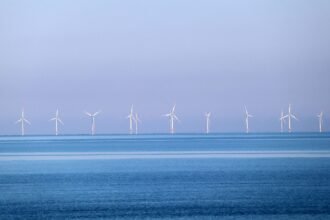US Halt of Revolution Wind Project
New England officials and business leaders continue to push back against the Trump administration’s sudden decision to halt construction on the Revolution Wind offshore project. The move, which came late last week, has left stakeholders scrambling and raised questions about energy security, jobs, and political motives. As of today, no new developments have emerged from the White House, but the backlash grows louder.
The Sudden Stop-Work Order
The Bureau of Ocean Energy Management issued a stop-work order on August 22, 2025, effectively pausing all activities on Revolution Wind. This nearly complete offshore wind farm sits off Rhode Island’s coast and promises to generate clean energy for hundreds of thousands of homes. Developers at Denmark-based Orsted had already invested $4 billion and reached 80% completion, with full operations slated for 2026.
The administration cited vague “national security concerns” as the reason for the halt, but offered no specifics. This lack of detail frustrates state leaders, who demand transparency. U.S. Senator Richard Blumenthal from Connecticut called for immediate explanations, even suggesting private briefings if classified information is involved. Orsted, caught off guard, has complied with the order but seeks clarity to resume work.
Revolution Wind represents a key piece of America’s push toward renewable energy. The project would produce enough electricity to power 350,000 homes in Rhode Island and Connecticut, helping both states meet long-term climate goals through 20-year power purchase agreements. Workers have labored for years, installing turbines and infrastructure in challenging ocean conditions. Now, everything grinds to a halt, leaving equipment idle and futures uncertain.
Economic Blow: Jobs and Investments at Risk
Business groups and unions warn that the decision delivers a severe hit to the regional economy. It puts 1,000 jobs on the line, affecting skilled workers from North America’s Building Trades Unions who have trained extensively for this work. NABTU President Sean McGarvey voiced strong disapproval, saying the order “throws skilled American workers off the job” after a decade of preparation.
In Rhode Island, where the project anchors much of the local clean energy sector, the impact feels personal. Michael F. Sabitoni, a union leader, expressed raw frustration: “This is bulls–t on what’s happening with the hard-working men and women that have dedicated a lot of time and effort and training.” Patrick Crowley, president of the Rhode Island AFL-CIO, echoed this sentiment, questioning the logic behind derailing “our present and our future.”
The broader economic ripple could extend beyond jobs. Delays might scare off investors in offshore wind, a growing industry that has pumped billions into U.S. coastal communities. Rhode Island Governor Daniel McKee described the halt as “reckless” and an “attack on our jobs, our energy, our families and their ability to pay the bills.” He likened it to quitting a marathon just before the finish line.
Grid Reliability Under Threat
Energy experts highlight another critical concern: the halt jeopardizes New England’s power grid. ISO New England, the operator serving 15 million people, stated that delaying Revolution Wind increases reliability risks. The project factored into their forecasts for handling peak demands, especially during heatwaves that have strained supplies in recent years.
Without this new source of renewable power, the region faces higher blackout risks and elevated energy costs. RENEW Northeast, a clean energy advocacy group, argued that blocking such projects undermines efforts to lower prices and meet rising demand from industries like data centers. ISO New England emphasized that the decision could harm economic growth, as reliable energy attracts businesses.
This isn’t the first time weather extremes have tested the grid. Recent summers have seen record demands, and losing Revolution Wind’s contribution could force reliance on costlier, dirtier fossil fuels. Officials worry this sets a dangerous precedent, making the Northeast more vulnerable to supply disruptions.
Political Firestorm and Calls for Reversal
The decision fits into President Donald Trump’s longstanding criticism of wind energy, which he has called ugly, unreliable, and expensive. Earlier this year, his administration paused Equinor’s Empire Wind project, only to reverse it after negotiations with New York officials. Now, similar tactics appear at play, with a national security probe into wind turbine imports adding fuel to the fire.
Democratic leaders in New England aren’t holding back. U.S. Senator Jack Reed dismissed the security claims, saying, “It’s not about national security. It’s about the president’s insecurity,” and suggested it benefits Big Oil. Senator Sheldon Whitehouse called it a “deliberate blow” to serve fossil fuel donors who contributed heavily to Trump’s campaign.
Not everyone opposes the halt. Green Oceans, a Rhode Island environmental group, supports it, citing flaws in the permitting process and potential harm to ocean habitats and coastal communities. Still, most stakeholders urge a quick reversal. Governors from affected states demand resumption, hinting at possible legal challenges if the standoff persists.
Looking Ahead: Implications for Clean Energy
As New England grapples with this setback, the halt raises bigger questions about U.S. energy policy. Offshore wind holds promise for reducing emissions and creating jobs, but political hurdles could slow progress. Rhode Island positions itself as the “birthplace of the offshore wind industry,” and losing momentum here might deter future projects nationwide.
Business analysts watch closely, noting that uncertainty drives up costs and delays innovation. If the administration provides no clear path forward, states might explore workarounds or court battles. For now, workers wait, grids strain, and the debate over America’s energy future intensifies.
In a region hungry for affordable, clean power, this decision feels like a step backward. Officials hope reason prevails, but as Governor McKee put it, the clock ticks on families’ ability to afford their bills. The coming days may reveal whether dialogue or discord defines the next chapter.







